外研版九年级上Module2Public holidays Unit3Language in use课件(共25张PPT)
文档属性
| 名称 | 外研版九年级上Module2Public holidays Unit3Language in use课件(共25张PPT) |
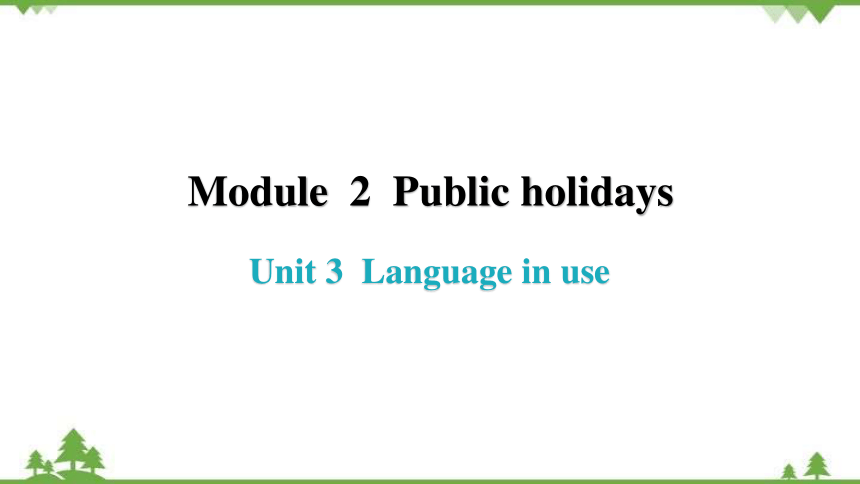
|
|
| 格式 | pptx | ||
| 文件大小 | 112.9KB | ||
| 资源类型 | 教案 | ||
| 版本资源 | 外研版 | ||
| 科目 | 英语 | ||
| 更新时间 | 2022-06-17 00:00:00 | ||
图片预览

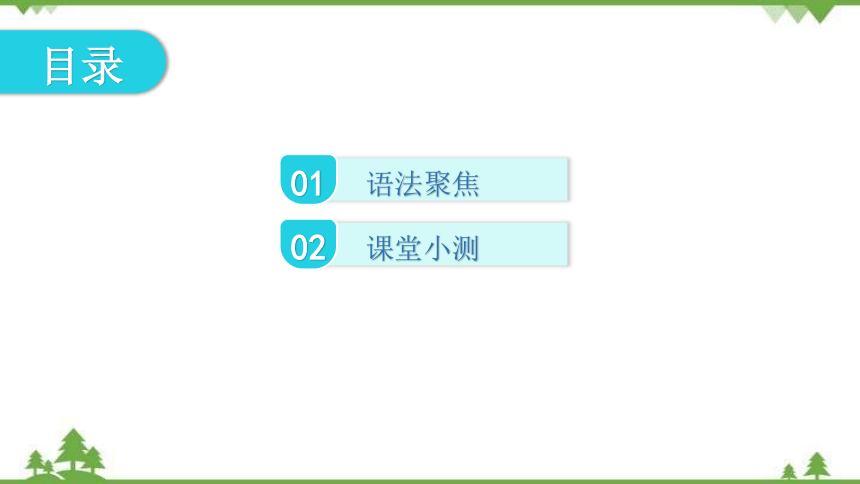
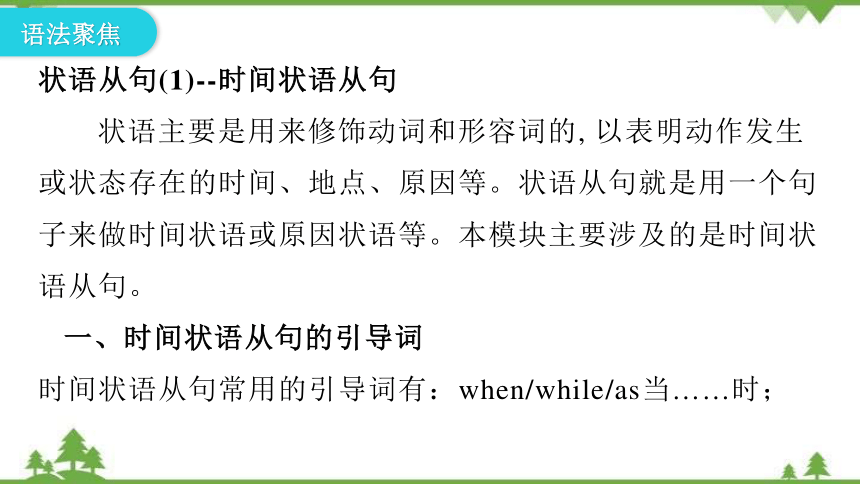
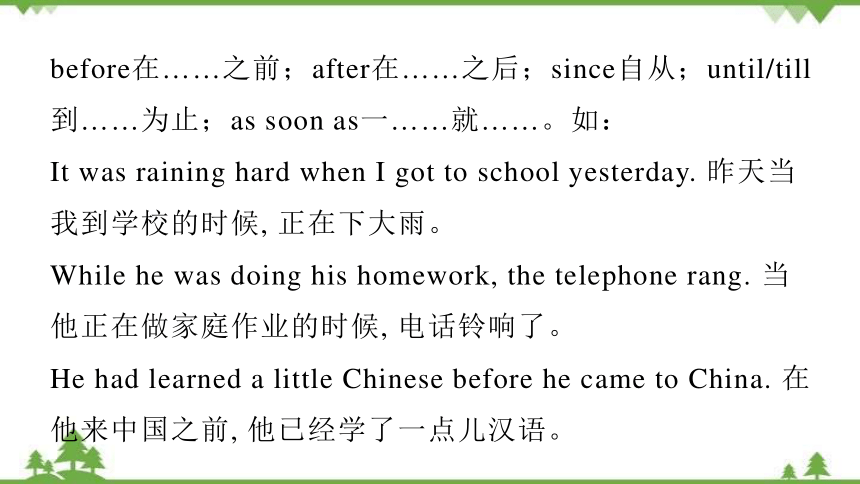
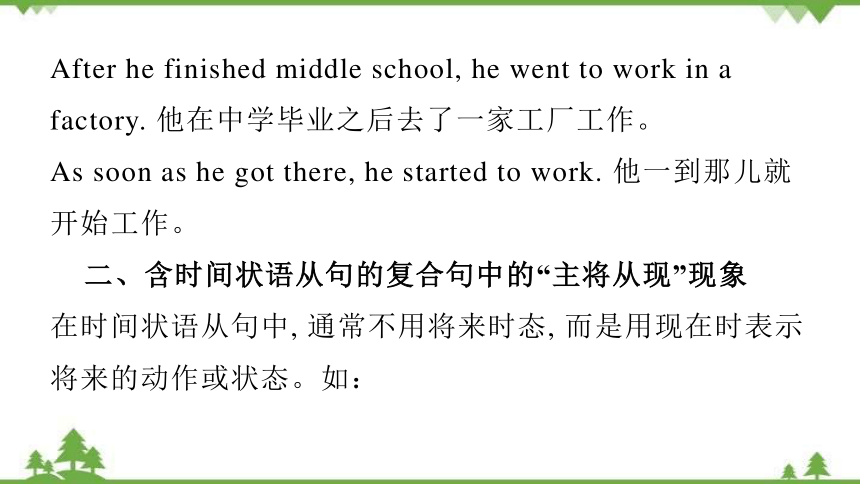
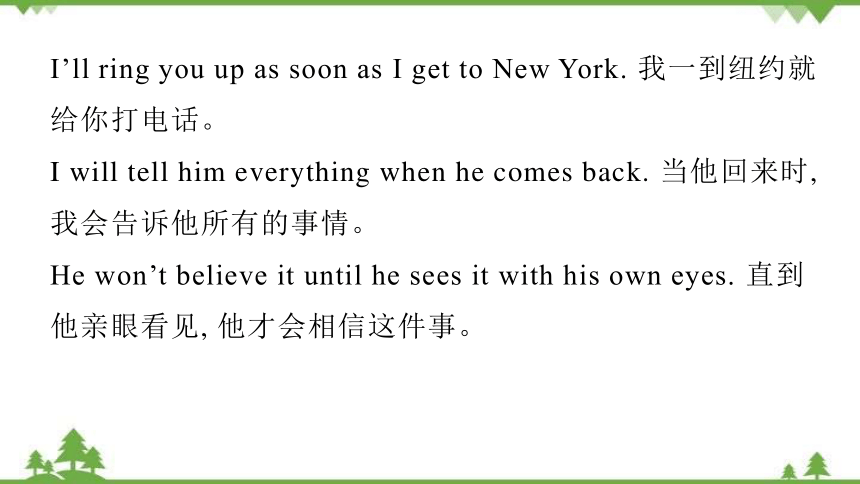
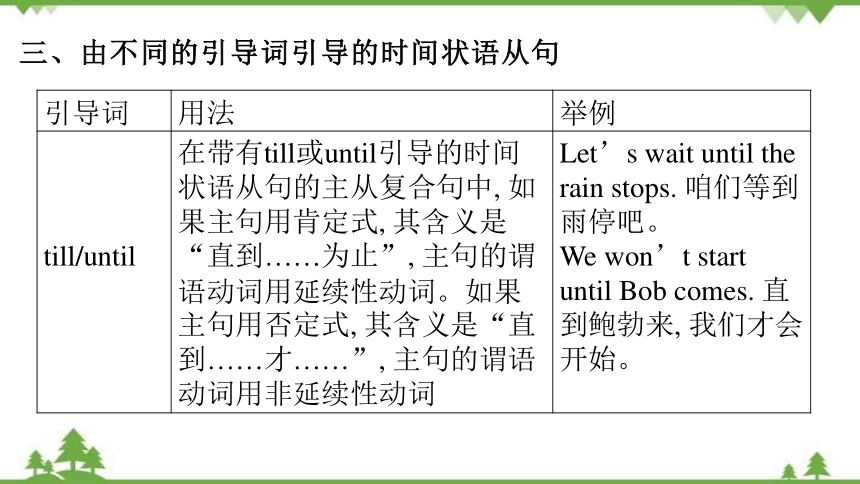
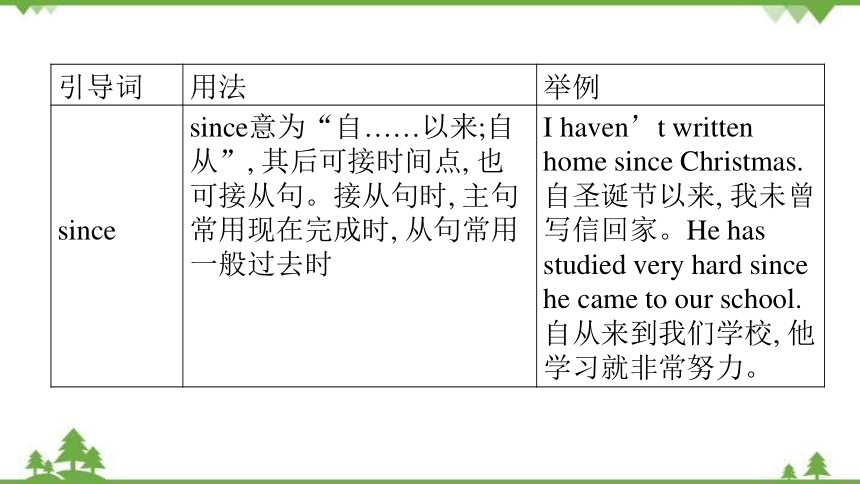
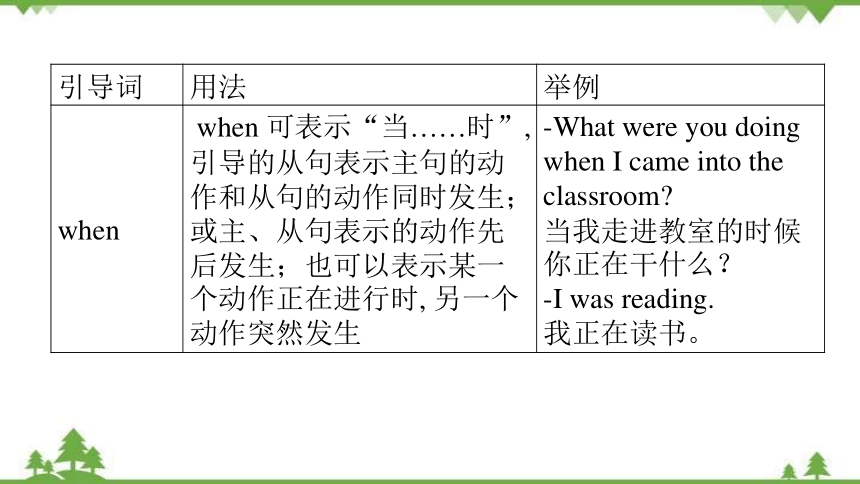
文档简介
(共25张PPT)
Unit 3 Language in use
Module 2 Public holidays
目录
语法聚焦
01
课堂小测
02
语法聚焦
状语从句(1)--时间状语从句
状语主要是用来修饰动词和形容词的, 以表明动作发生或状态存在的时间、地点、原因等。状语从句就是用一个句子来做时间状语或原因状语等。本模块主要涉及的是时间状语从句。
一、时间状语从句的引导词
时间状语从句常用的引导词有:when/while/as当……时;
before在……之前;after在……之后;since自从;until/till到……为止;as soon as一……就……。如:
It was raining hard when I got to school yesterday. 昨天当我到学校的时候, 正在下大雨。
While he was doing his homework, the telephone rang. 当他正在做家庭作业的时候, 电话铃响了。
He had learned a little Chinese before he came to China. 在他来中国之前, 他已经学了一点儿汉语。
After he finished middle school, he went to work in a factory. 他在中学毕业之后去了一家工厂工作。
As soon as he got there, he started to work. 他一到那儿就开始工作。
二、含时间状语从句的复合句中的“主将从现”现象
在时间状语从句中, 通常不用将来时态, 而是用现在时表示将来的动作或状态。如:
I’ll ring you up as soon as I get to New York. 我一到纽约就给你打电话。
I will tell him everything when he comes back. 当他回来时, 我会告诉他所有的事情。
He won’t believe it until he sees it with his own eyes. 直到他亲眼看见, 他才会相信这件事。
三、由不同的引导词引导的时间状语从句
引导词 用法 举例
till/until 在带有till或until引导的时间状语从句的主从复合句中, 如果主句用肯定式, 其含义是“直到……为止”, 主句的谓语动词用延续性动词。如果主句用否定式, 其含义是“直到……才……”, 主句的谓语动词用非延续性动词 Let’s wait until the rain stops. 咱们等到雨停吧。
We won’t start until Bob comes. 直到鲍勃来, 我们才会开始。
引导词 用法 举例
since since意为“自……以来;自从”, 其后可接时间点, 也可接从句。接从句时, 主句常用现在完成时, 从句常用一般过去时 I haven’t written home since Christmas. 自圣诞节以来, 我未曾写信回家。He has studied very hard since he came to our school. 自从来到我们学校, 他学习就非常努力。
引导词 用法 举例
when when 可表示“当……时”, 引导的从句表示主句的动作和从句的动作同时发生;或主、从句表示的动作先后发生;也可以表示某一个动作正在进行时, 另一个动作突然发生 -What were you doing when I came into the classroom
当我走进教室的时候你正在干什么?
-I was reading.
我正在读书。
引导词 用法 举例
When they arrived at the station, the train had left. 当他们到达车站的时候, 火车已经离开了。
My pen dropped on the ground when I was walking in the park. 当我在公园散步的时候我的钢笔掉落在地上。
引导词 用法 举例
while while也可表示“当……时”, 引导的时间状语从句用来表示某事发生时较长的时间背景, 从句通常要用进行时。如果主句和从句中的动作是两个同时进行的长时间动作或事件, 那么主句也要用进行时 While we were boating on the lake, we saw a fish jump out of the water. 当我们正在湖中划船时, 我们看见了一条鱼跳出了水面。I was doing my homework while my father was watching TV. 当爸爸正在看电视时, 我正在做作业。
引导词 用法 举例
as as意为“当……时;一边……一边……”, 引导的时间状语从句常常用来表示主句和从句的动作是短时间的动作并且是同时发生的 As the students walked along the lake, they sang happily.学生们一边沿着湖边走, 一边愉快地唱歌。Will you take a message to Mary as you go past her room 你路过玛丽的房间时, 请给她捎个口信好吗
课堂小测
一、用方框中所给单词或短语填空
1. I have never seen her ______ he moved away.
2. Class 1 and Class 4 will visit Angel in his new house ____________________ the winter holiday starts.
3. I was riding to my aunt’s home ________ a traffic accident happened at the second crossing near the RT-Mart.
when, since, after, as soon as, until
since
as soon as / when
when
4. She won’t be able to see her son ________ the semester comes to an end.
5. Ben says that he usually runs around the park for at least four circles ________ he gets up every day.
until
after
二、找出下列句子的错误, 并在横线上进行更正
6. Two cellists will give a live concert in Shanghai in 28th April, 2021.
_______________________________________________
7. We’ll finish repairing the museum before the President arrive.
_________________________________________________
8. Gump was running along the river when Jenny was
in改为on
arrive改为arrives
coming.
_______________________________________________
9. He told me they had great funs after the party began.
_______________________________________________
10. Kids have enjoyed themselves a lot since the trip has started.
_______________________________________________
was coming改为came
funs改为fun
has started改为started
三、单项填空(语法专练)
( )11. Don’t go out ____ the rain stops. Otherwise, you’ll get wet!
A. after B. since
C. when D. until
D
( )12. We have been friends________ .
A. last year B. one year ago
C. since we met last year D. when we met last year
( )13. -Did you catch the first subway this morning
-No, I didn’t. It had started moving ____ I could get on it.
A. before B. since C. after D. as soon as
C
A
( )14. I was watching TV___ my brother was writing an email at home at this time last night.
A. as soon as B. after C. until D. while
( )15. -Will you please give the book to Jane
-Sure. I’ll give it to her ____ she comes back.
A. before B. until C. because D. as soon as
D
D
四、语法选择(核心素养:文化意识)
Qingming has been an important festival since ancient times in China. According to its literal interpretation (字面翻译) in Chinese, “Qingming” 16 “clear and bright”, which marks(表示) that a 17 season with more rain is coming. And 18 that day, farmers start growing their crops. This year, the festival falls on 4th April.
It is said that Qingming has a history about 2,500 years.
19 M(m)ost important activity on this day is to honor ancestors(祖先) and remember dead family members. Chinese families will sweep the tombs(坟墓) and clean away the grass around 20. Then they burn paper money and put flowers and fruit and now even a paper iPhone in front of the tombs. They hope the 21 can enjoy them and bring the family good luck.
Drizzling rain(细雨) and sad 22 help create plenty of
poems describing the festival. One of the most famous poems is Du Mu’s Qingming.
However, Qingming is not all about sad emotions. It is also the time 23 the sun shines soft and bright, the trees and grass become green, and flowers blossom(开花). People have spring outing or taqing during the festival. Swinging(荡秋千), 24qingtuan, drawing paintings on eggs and knocking boiled eggs against each other are all fun activities.
25 Qingming is not only a time of sadness for many people, but a poetic and energetic festival for mid-spring.
( )16. A. means B. mean C. meaning D. meant
( )17. A. most warmest B. warmer
C. warmest D. more warmer
( )18. A. until B. before C. since D. after
( )19. A. The B. / C. A D. An
( )20. A. they B. their C. them D. themselves
A
B
D
A
C
( )21. A. dying B. dead C. died D. death
( )22. A. feels B. feelings C. feel D. feeling
( )23. A. where B. why C. how D. when
( )24. A. to eat B. eats C. eating D. eaten
( )25. A. Because B. Then C. But D. So
B
B
D
C
D
课后作业
Unit 3 Language in use
Module 2 Public holidays
目录
语法聚焦
01
课堂小测
02
语法聚焦
状语从句(1)--时间状语从句
状语主要是用来修饰动词和形容词的, 以表明动作发生或状态存在的时间、地点、原因等。状语从句就是用一个句子来做时间状语或原因状语等。本模块主要涉及的是时间状语从句。
一、时间状语从句的引导词
时间状语从句常用的引导词有:when/while/as当……时;
before在……之前;after在……之后;since自从;until/till到……为止;as soon as一……就……。如:
It was raining hard when I got to school yesterday. 昨天当我到学校的时候, 正在下大雨。
While he was doing his homework, the telephone rang. 当他正在做家庭作业的时候, 电话铃响了。
He had learned a little Chinese before he came to China. 在他来中国之前, 他已经学了一点儿汉语。
After he finished middle school, he went to work in a factory. 他在中学毕业之后去了一家工厂工作。
As soon as he got there, he started to work. 他一到那儿就开始工作。
二、含时间状语从句的复合句中的“主将从现”现象
在时间状语从句中, 通常不用将来时态, 而是用现在时表示将来的动作或状态。如:
I’ll ring you up as soon as I get to New York. 我一到纽约就给你打电话。
I will tell him everything when he comes back. 当他回来时, 我会告诉他所有的事情。
He won’t believe it until he sees it with his own eyes. 直到他亲眼看见, 他才会相信这件事。
三、由不同的引导词引导的时间状语从句
引导词 用法 举例
till/until 在带有till或until引导的时间状语从句的主从复合句中, 如果主句用肯定式, 其含义是“直到……为止”, 主句的谓语动词用延续性动词。如果主句用否定式, 其含义是“直到……才……”, 主句的谓语动词用非延续性动词 Let’s wait until the rain stops. 咱们等到雨停吧。
We won’t start until Bob comes. 直到鲍勃来, 我们才会开始。
引导词 用法 举例
since since意为“自……以来;自从”, 其后可接时间点, 也可接从句。接从句时, 主句常用现在完成时, 从句常用一般过去时 I haven’t written home since Christmas. 自圣诞节以来, 我未曾写信回家。He has studied very hard since he came to our school. 自从来到我们学校, 他学习就非常努力。
引导词 用法 举例
when when 可表示“当……时”, 引导的从句表示主句的动作和从句的动作同时发生;或主、从句表示的动作先后发生;也可以表示某一个动作正在进行时, 另一个动作突然发生 -What were you doing when I came into the classroom
当我走进教室的时候你正在干什么?
-I was reading.
我正在读书。
引导词 用法 举例
When they arrived at the station, the train had left. 当他们到达车站的时候, 火车已经离开了。
My pen dropped on the ground when I was walking in the park. 当我在公园散步的时候我的钢笔掉落在地上。
引导词 用法 举例
while while也可表示“当……时”, 引导的时间状语从句用来表示某事发生时较长的时间背景, 从句通常要用进行时。如果主句和从句中的动作是两个同时进行的长时间动作或事件, 那么主句也要用进行时 While we were boating on the lake, we saw a fish jump out of the water. 当我们正在湖中划船时, 我们看见了一条鱼跳出了水面。I was doing my homework while my father was watching TV. 当爸爸正在看电视时, 我正在做作业。
引导词 用法 举例
as as意为“当……时;一边……一边……”, 引导的时间状语从句常常用来表示主句和从句的动作是短时间的动作并且是同时发生的 As the students walked along the lake, they sang happily.学生们一边沿着湖边走, 一边愉快地唱歌。Will you take a message to Mary as you go past her room 你路过玛丽的房间时, 请给她捎个口信好吗
课堂小测
一、用方框中所给单词或短语填空
1. I have never seen her ______ he moved away.
2. Class 1 and Class 4 will visit Angel in his new house ____________________ the winter holiday starts.
3. I was riding to my aunt’s home ________ a traffic accident happened at the second crossing near the RT-Mart.
when, since, after, as soon as, until
since
as soon as / when
when
4. She won’t be able to see her son ________ the semester comes to an end.
5. Ben says that he usually runs around the park for at least four circles ________ he gets up every day.
until
after
二、找出下列句子的错误, 并在横线上进行更正
6. Two cellists will give a live concert in Shanghai in 28th April, 2021.
_______________________________________________
7. We’ll finish repairing the museum before the President arrive.
_________________________________________________
8. Gump was running along the river when Jenny was
in改为on
arrive改为arrives
coming.
_______________________________________________
9. He told me they had great funs after the party began.
_______________________________________________
10. Kids have enjoyed themselves a lot since the trip has started.
_______________________________________________
was coming改为came
funs改为fun
has started改为started
三、单项填空(语法专练)
( )11. Don’t go out ____ the rain stops. Otherwise, you’ll get wet!
A. after B. since
C. when D. until
D
( )12. We have been friends________ .
A. last year B. one year ago
C. since we met last year D. when we met last year
( )13. -Did you catch the first subway this morning
-No, I didn’t. It had started moving ____ I could get on it.
A. before B. since C. after D. as soon as
C
A
( )14. I was watching TV___ my brother was writing an email at home at this time last night.
A. as soon as B. after C. until D. while
( )15. -Will you please give the book to Jane
-Sure. I’ll give it to her ____ she comes back.
A. before B. until C. because D. as soon as
D
D
四、语法选择(核心素养:文化意识)
Qingming has been an important festival since ancient times in China. According to its literal interpretation (字面翻译) in Chinese, “Qingming” 16 “clear and bright”, which marks(表示) that a 17 season with more rain is coming. And 18 that day, farmers start growing their crops. This year, the festival falls on 4th April.
It is said that Qingming has a history about 2,500 years.
19 M(m)ost important activity on this day is to honor ancestors(祖先) and remember dead family members. Chinese families will sweep the tombs(坟墓) and clean away the grass around 20. Then they burn paper money and put flowers and fruit and now even a paper iPhone in front of the tombs. They hope the 21 can enjoy them and bring the family good luck.
Drizzling rain(细雨) and sad 22 help create plenty of
poems describing the festival. One of the most famous poems is Du Mu’s Qingming.
However, Qingming is not all about sad emotions. It is also the time 23 the sun shines soft and bright, the trees and grass become green, and flowers blossom(开花). People have spring outing or taqing during the festival. Swinging(荡秋千), 24qingtuan, drawing paintings on eggs and knocking boiled eggs against each other are all fun activities.
25 Qingming is not only a time of sadness for many people, but a poetic and energetic festival for mid-spring.
( )16. A. means B. mean C. meaning D. meant
( )17. A. most warmest B. warmer
C. warmest D. more warmer
( )18. A. until B. before C. since D. after
( )19. A. The B. / C. A D. An
( )20. A. they B. their C. them D. themselves
A
B
D
A
C
( )21. A. dying B. dead C. died D. death
( )22. A. feels B. feelings C. feel D. feeling
( )23. A. where B. why C. how D. when
( )24. A. to eat B. eats C. eating D. eaten
( )25. A. Because B. Then C. But D. So
B
B
D
C
D
课后作业
同课章节目录
- Module 1 Wonders of the world
- Unit 1 It's more than 2,000 years old.
- Unit 2 The Grand Canyon was not just big.
- Unit 3 Language in use
- Module 2 Public holidays
- Unit 1 My family always go somewhere interesting a
- Unit 2 We have celebrated the festival since the f
- Unit 3 Language in use
- Module 3 Heroes
- Unit 1 She trained hard,so she became a great play
- Unit 2There were few doctors, so he had to work ve
- Unit 3 Language in use
- Module 4 Home alone
- Unit 1 I can look after myself, although it won’t
- Unit 2 I became so bored with their orders that I
- Unit 3 Language in use
- Module 5 Museums
- Unit 1 Don't cross that rope!
- Unit 2 If you ever go to London, make sure you vis
- Unit 3 Language in use
- Module 6 Problems
- Unit 1 If I start after dinner, I'll finish it be
- Unit 2 If you tell him the truth now, you will sho
- Unit 3 Language in use
- Revision Module A
- Module 7 Great books
- Unit 1 We're still influenced by Confucius's idea
- Unit 2 It is still read and loved.
- Unit 3 Language in use
- Module 8 Sports life
- Unit 1 Daming wasn't chosen for the team last time
- Unit 2 He was invited to competitions around the w
- Unit 3 Language in use
- Module 9 Great inventions
- Unit 1 Will computers be used more than books in t
- Unit 2 Will books be replaced by the Internet?
- Unit 3 Language in use
- Module 10 Australia
- Unit 1 I have some photos that I took in Australia
- Unit 2 The game that they like most is Australian
- Unit 3 Language in use
- Module 11 Photos
- Unit 1 He's the boy who won the photo competition
- Unit 2 The photo which we liked best was taken by
- Unit 3 Language in use
- Module 12 Save our world
- Unit 1 If everyone starts to do something, the wor
- Unit 2 Repeat these three words daily: reduce, reu
- Unit 3 Language in use
- Revision Module B
